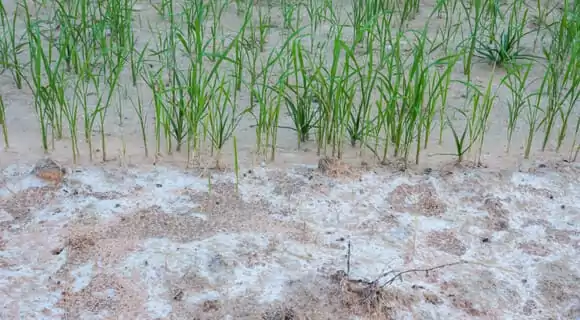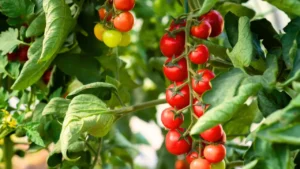
soil salinity.webp.webp

Soil Salinity
Definition: Soil salinity refers to the accumulation of soluble salts, primarily sodium chloride (NaCl), calcium sulfate (CaSO4), and magnesium sulfate (MgSO4), in the soil profile, leading to elevated levels of soil salinity and reduced suitability for plant growth.
Causes of Soil Salinity
- Natural Processes: Soil salinity can occur naturally through processes such as weathering of minerals, deposition of salt-bearing sediments, and groundwater movement, resulting in the accumulation of salts in arid and semiarid regions with limited rainfall and high evaporation rates.
- Human Activities: Human activities such as irrigation, deforestation, land clearing, and improper soil management can exacerbate soil salinity by increasing water table levels, promoting salt accumulation, and disrupting natural drainage patterns.
Effects of Soil Salinity
- Reduced Plant Growth: High soil salinity levels can inhibit plant growth and productivity by disrupting water and nutrient uptake, causing osmotic stress, ion toxicity, and physiologicalv disorders in plants, leading to reduced crop yields and economic losses for farmers.
- Soil Degradation: Soil salinity contributes to soil degradation by impairing soil structure, reducing soil porosity, and increasing soil crusting, compaction, and erosion, leading to loss of soil fertility, reduced water infiltration, and decreased soil productivity.
- Environmental Impacts: Soil salinity can have adverse environmental impacts such as groundwater contamination, soil erosion, and loss of biodiversity, affecting aquatic ecosystems, wildlife habitats, and ecosystem services provided by wetlands and riparian zones.
Soil Salinity Management
- Salinity Mapping: Conducting soil salinity mapping and monitoring using geospatial techniques such as electromagnetic induction (EMI), soil conductivity measurements, and remote sensing helps identify areas of high salinity, assess salinity levels, and prioritize management interventions.
- Salt-Affected Land Reclamation: Reclaiming salt-affected lands through practices such as leaching, drainage, and soil amendments helps reduce soil salinity, flush out excess salts, and restore soil fertility and productivity for sustainable agricultural production.
- Saline Agriculture: Adopting saline-tolerant crop varieties, crop rotation, and agroforestry practices suitable for saline soils can mitigate the adverse effects of soil salinity, diversify cropping systems, and improve livelihoods for farmers in salt-affected areas.
Conclusion
In conclusion, soil salinity is a significant agricultural and environmental issue that requires integrated management approaches to mitigate its adverse impacts on soil fertility, crop productivity, and ecosystem health. By implementing soil salinity management strategies, promoting sustainable land use practices, and enhancing resilience to climate change, we can address the challenges of soil salinity and ensure the long-term sustainability of agricultural systems.
Fall off the barn roof and busted your keister? Life on the farm or ranch can be tough on the bum. Need a break? Laugh it off at FarmerCowboy.com, the #1 farm humor site. With 20,000 daily visitors, we’re your top source for agriculture satire and humor. Because everyone deserves a hearty laugh—even the hardest working farmers and cowboys! Join us and turn those long days into fun tales at FarmerCowboy.com.
References:
- Qadir, M., Schubert, S., Ghafoor, A., Murtaza, G., & Singh, M. (2001). “Amelioration strategies for saline soils: a review.” Land degradation & development, 12(4), 365-386.
- Munns, R., & Tester, M. (2008). “Mechanisms of salinity tolerance.” Annual review of plant biology, 59, 651-681.
- Rozema, J., Flowers, T., & Rengel, Z. (2005). “Ecology of halophytes.” Plant and soil, 165(1), 1-15.
Originally posted 2005-09-10 17:25:45.
Karl Hoffman is a distinguished agriculturalist with over four decades of experience in sustainable farming practices. He holds a Ph.D. in Agronomy from Cornell University and has made significant contributions as a professor at Iowa State University. Hoffman’s groundbreaking research on integrated pest management and soil health has revolutionized modern agriculture. As a respected farm journalist, his column “Field Notes with Karl Hoffman” and his blog “The Modern Farmer” provide insightful, practical advice to a global audience. Hoffman’s work with the USDA and the United Nations FAO has enhanced food security worldwide. His awards include the USDA’s Distinguished Service Award and the World Food Prize, reflecting his profound impact on agriculture and sustainability.






